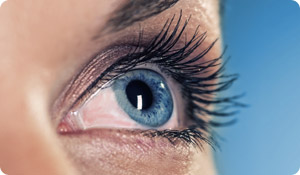
You may love the color pink, except when it's used to describe your eyes. When your eyes feel particularly raw and uncomfortable at times, seasonal triggers can be to blame for causing allergic conjunctivitis. Allergic conjunctivitis often looks and feels very similar to bouts of infectious pink eye you had as a child; however, when the cause is allergies, it requires a different strategy to prevent and treat symptoms.
Identifying the Source
Sometimes it can be difficult to distinguish between the two types of pink eye: allergic and infectious. Your doctor may need to confirm that your symptoms are allergy-based. This is important because an infectious pink eye is caused by a virus and is quite contagious, making it necessary for people who have it to avoid contact with others until it resolves. Allergic conjunctivitis, on the other hand, is caused when your immune system reacts to allergens like pollen, mold, dust, make up, animals, smoke, and even certain medications, and there's no danger of it spreading.
How to Treat the Problem
You'll probably want to keep your sunglasses on even indoors to hide some of the facial reactions to allergic conjunctivitis or you may be tempted to scratch and rub at your eyes. But doctors suggest trying some other, more constructive methods to relieve the discomfort instead or better yet, to head it off in the first place.
- Keep a list of when your eyes feel worse and try to narrow in on what could be causing the reaction.
- Check mold and pollen counts if you believe your symptoms are caused by outdoor triggers.
- Plan to stay indoors with the windows closed and the air conditioner on days when the levels are particularly high.
- Wash your hair and clothing thoroughly to remove triggers after spending time outdoors.
- Rinse your eyes and use a cold compress to relieve irritation and swelling.
- Avoid wearing contacts while your eyes are bothered, since this could irritate them.
When these efforts aren't enough to prevent or treat your allergic conjunctivitis symptoms, you should also talk to your doctor about taking eye drops to relieve the discomfort. He may also suggest taking antihistamine pills to help block your allergic reaction or prescribe something stronger. Keep in mind that as bad as allergic conjunctivitis looks and feels, it will eventually go away. In the meantime, it shouldn't cause any harm to your vision.
Sources:
American Academy of Allergy, Asthma and Immunology
http://www.acaai.org/patients/resources/allergies/Pages/eye-allergies.aspx
American Academy of Family Physicians
http://familydoctor.org/online/famdocen/home/common/allergies/basics/678.html
Medline Plus





